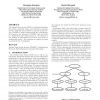107
click to vote
ICNP
2009
IEEE
14 years 12 months ago
2009
IEEE
The Domain Name System (DNS) is integral to today's Internet. Name resolution for a domain is often dependent on servers well outside the control of the domain's owner. I...
119
click to vote
CACM
2005
15 years 2 months ago
2005
Networked communications inherently depend on the ability of the sender of a message to indicate through some token how the message should be delivered to a particular recipient. ...
NETWORK
2008
15 years 2 months ago
2008
The Domain Name System (DNS) is the global lookup service for network resources. To protect DNS information, the DNS Security Extensions (DNSSEC) have been developed and deployed ...
106
click to vote
JNW
2008
15 years 2 months ago
2008
Abstract-- The Domain Name System (DNS) is a distributed tree-based database largely used to translate a human readable machine name into an IP address. The DNS security extensions...
113
click to vote
NSDI
2004
15 years 3 months ago
2004
The Web relies on the Domain Name System (DNS) to resolve the hostname portion of URLs into IP addresses. This marriage-of-convenience enabled the Web's meteoric rise, but th...
DSN
2004
IEEE
15 years 5 months ago
2004
IEEE
A correctly working Domain Name System (DNS) is essential for the Internet. Due to its significance and because of deficiencies in its current design, the DNS is vulnerable to a w...
109
click to vote
IICS
2010
Springer
15 years 6 months ago
2010
Springer
Abstract. The Domain Name System (DNS) has been the naming service of the Internet for more than 20 years. It is the foundation of virtually all other distributed service. The deï¬...
131
click to vote
CCS
2001
ACM
15 years 6 months ago
2001
ACM
The Domain Name System (DNS) is a distributed database that allows convenient storing and retrieving of resource records. DNS has been extended to provide security services (DNSSE...
111
click to vote
DISCEX
2003
IEEE
15 years 7 months ago
2003
IEEE
The Domain Name System is critical for the proper operation of applications on the Internet. Unfortunately, the DNS has a number of significant security weaknesses that can result...
126
click to vote
MWCN
2004
Springer
15 years 7 months ago
2004
Springer
: Mobility management is an important task in wireless networks. The Mobile IP protocol provides a basic solution to the mobility management. However, Mobile IP suffers from severa...


